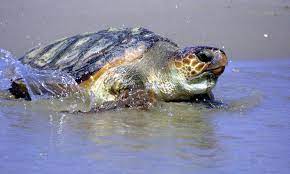
ATLANTA – A coastal Georgia nonprofit is challenging a plan by the U.S. Army Corps of Engineers to do away with seasonal limitations on dredging activities that have long protected sea turtles and other marine life.
In a federal lawsuit filed Monday, the group One Hundred Miles is seeking a preliminary injunction to block the Corps from conducting year-round operation and maintenance dredging in Brunswick Harbor starting as early as mid-May.
The Corps historically has limited dredging to mid-December through the end of March, a period when adult loggerheads and other sensitive species are far less abundant in Georgia’s coastal waters. Loggerhead nesting season in Georgia traditionally begins May 1 and runs through October.
“Our state has long rallied around our loggerhead sea turtles and invested in their protection,” said Catherine Ridley, coordinator and vice president of education and communications at One Hundred Miles. “Georgians aren’t about to let the Corps throw away nearly six decades of conservation progress based on their illogical arguments and complete disregard for scientific data.”
The state-run Jekyll Island Authority has weighed in on the side of One Hundred Miles, recently sending a letter to the Corps expressing concern over year-round dredging.
The Corps has said the plan is part of a more holistic effort to protect a larger number of endangered species in coastal waters, including the North Atlantic right whale that comes to the area for its calving season each year.
“The goal is to try to figure out how to do everything better for all the species,” Nicole Bonine, an environmental compliance sustainability and energy program manager for the corps’ South Atlantic Division, said in March.
“We’re really hoping that if we can get all of these techniques in place and continue to build on information gathered year over year, we can ultimately reduce the number of turtle [deaths or injuries] every year.”
But Megan Huynh, senior attorney for the Southern Environmental Law Center, which is representing One Hundred Miles, said the Corps hasn’t adequately reviewed the plan or offered enough opportunities for public comment.
“State and federal agencies have relied on seasonal dredging windows for decades for the simple fact that these windows have proven to be effective in reducing risks to sea turtles and other coastal wildlife,” she said.
A recent two-week comment period offered by the Georgia Department of Natural Resources generated more than 1,500 letters in opposition to year-round dredging.
The Georgia coast is home to the oldest loggerhead sea turtle nesting project in the world, started in 1964 on Little Cumberland Island.
